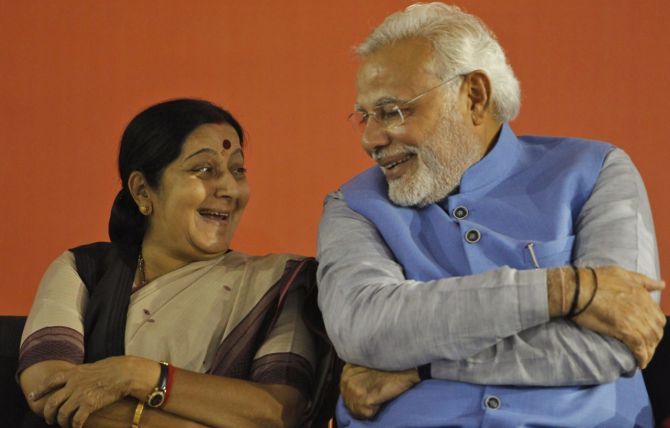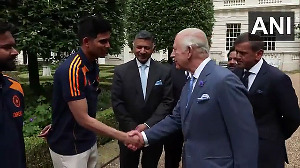On Sunday, after External Affairs Minister Sushma Swaraj came under attack for lending help to the scam-tainted Lalit Modi, BJP president Amit Shah and Home Minister Rajnath Singh stood by her, saying that there was no justification for her to quit.
Sheela Bhatt/Rediff.com decodes why Modi has decided to retain her in the Union Cabinet despite this controversy and their many internal differences.

Prime Minister Narendra Modi on Sunday took a pragmatic decision to ask Bharatiya Janata Party president Amit Shah to defend External Affairs Minister Sushma Swaraj, who has been dragged into a controversy over the propriety of helping former Indian Premier League commissioner, the scandal-tainted Lalit Modi.
Lalit Modi, who has made Britain his home since 2010, is wanted in India in connection with a probe into alleged foreign exchange regulation violations in the Indian Premier League tournament held in South Africa in 2009. The United Progressive Alliance government had revoked his passport, and was seeking his extradition.
In fact, soon after the story broke in the Sunday Times (London), and later on Indian television channels, of how she had helped Modi procure travel documents, Swaraj took to Twitter to defend her actions.
In a series of tweets, she defender her action: 'Some time on July 14, Lalit Modi spoke to me that his wife was suffering from cancer and surgery was fixed on August 4 in Portugal. He told me that he had to be present in the hospital to sign the consent papers. He informed me that he had applied for travel documents in London and the UK government was prepared to give him the travel documents. However, they were restrained by the United Progressive Alliance government communication that this would spoil Indo-UK relations. Taking a humanitarian view, I conveyed to British high commissioner that British government should examine the request of Lalit Modi as per British rules and regulations and that if the British government chooses to give travel documents to Lalit Modi, that will not spoil our bilateral relations.'
Sushma further said, '(Indian-origin British MP) Keith Vaz also spoke to me and I told him precisely what I told the British high commissioner. I genuinely believe that in a situation such as this, giving emergency travel documents to an Indian citizen cannot and should not spoil relations between two countries.
'I may also state that only a few days later Delhi high court quashed the UPA government’s order impounding Lalit Modi’s passport on the ground that the said order was unconstitutional, being violative of fundamental rights and he got his passport back.'
'Regarding Jyotirmay Kaushal’s (Sushma’s relative and the son of a senior journalist) admission in a law course at Sussex University, he secured admission through the normal admission process in 2013 -- one year before I became minister.' Vaz was reported to have offered help to Kaushal to apply for a British law degree course.
A source in the government believes that the documents, which were used by Indian TV channels to nail the external affairs minister, were leaked by an RTI activist who was once close to lawyer Mahesh Jethmalani and former chief of Board of Control for Cricket in India N Srinivasan.
The same source also believes that Lalit Modi’s e-mail account had been hacked by someone who once wielded power in Indian cricket.
On Sunday, amidst growing clamour from the Opposition for her resignation, BJP president Amit Shah and Home Minister Rajnath Singh, putting aside all internal differences, lent Swaraj support. The differences stem mainly between Swaraj and Modi on one hand, and Swaraj and Finance Minister Arun Jaitley on the other.
It is well known that Jaitley and Sushma Swaraj have not been on good terms for the past few years. However, the PM and Shah’s decision to back Swaraj, speaks volumes about the BJP's internal, dynamic decision-making process.
Backing Swaraj, Amit Shah, in a carefully drafted statement, said the fact that Modi’s wife Meenal was suffering from cancer, had prompted Sushma to act in the manner she did and that he did not think it was a moral issue.
Shah further added that Sushma extending help to Modi was not similar to the help which was provided to Bofors scandal accused Ottavio Quattrocchi or former Union Carbide Corporation CEO Warren Anderson to escape from India.
While many may wonder about the reason behind Modi’s support to Sushma, some say the situation is delicate. On the one hand, if Modi supports her outright, then he too comes under the scanner and gives the Opposition the perfect ammunition to use against him.
However, on the other hand, if Sushma departs from the Cabinet, Modi loses talent, which is already in short supply. Furthermore, the entire government will face great criticism because Sushma will be too well-known a dissenter within the government.
Additionally, at a time when Modi’s foreign policy is in ‘still-in-the-making’ mould, Swaraj’s departure, especially now, days before the International Yoga Day which has been billed as one of the biggest events undertaken by the government, will leave Modi at a disadvantage.
Some insiders even went on to say that if Modi was the main target, firing at Sushma was not the best option since hitting her hard does not necessarily weaken Modi.
Former aviation minister Praful Patel, speaking to Rediff.com, said, “It was an error of judgement on Sushma Swaraj’s part to make that call to the British high commissioner to help Lalit Modi. It certainly amounts to a serious case of impropriety.”
Patel, an old hand at cricket management and a friend of Lalit Modi, however, refused to comment if Swaraj should resign. Instead, he said she should have put up the chronology of event before the public and accepted her error in judgement.
Patel told Rediff.com that when Lalit Modi’s passport was revoked by India in 2010, the former IPL chief had, through legal means, obtained permanent residency in Britain. In his case, the British Foreign Office would have granted him travel documents to fly to Lisbon, Portugal, where Modi’s wife Meenal was bring treated for cancer.
“Sushma’s phone call helped Modi get his travel document in haste,” says Patel.
However, the decision to support a Cabinet minister who has committed an impropriety, such as in this case, will cost the government, which will now not look only weaker over the issue of maintaining high standards of legal and moral propriety but the minister will also be more vulnerable, not only from within but also from outside.











